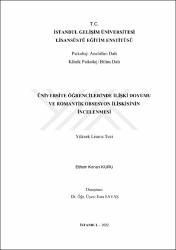| dc.contributor.author | Kuru, Ethem Kenan | |
| dc.date.accessioned | 2023-02-09T09:08:28Z | |
| dc.date.available | 2023-02-09T09:08:28Z | |
| dc.date.issued | 2022 | en_US |
| dc.identifier.uri | https://hdl.handle.net/11363/3847 | |
| dc.description | Danışman: DR. ÖĞR. ÜYESİ ESRA SAVAŞ
Yer Bilgisi: İstanbul Gelişim Üniversitesi / Lisansüstü Eğitim Enstitüsü / Psikoloji Ana Bilim Dalı
Konu: Psikoloji = Psychology | en_US |
| dc.description.abstract | Üniversite öğrencilerinde ilişki doyumu ve romantik obsesyon arasındaki ilişkinin belirlenmesi amaçlanmıştır. Bu amaç doğrultusunda ilgili değişkenleri ölçen ölçme araçları aracılığıyla veriler toplanmış ve analiz edilmiştir. İlişkisel ve anket yöntemiyle gerçekleştirilen araştırmada 18-25 yaş arası 200 (100 kadın, 100 erkek) üniversite öğrencisinden veriler elde edilmiştir. Katılımcıların en az 3 aydır aktif bir ilişkisi olması kriteri aranmıştır. Çalışmaya katılan bireylerin bilgileri araştırmacının oluşturduğu sosyo-demografik bilgi formuyla toplanmıştır. Üniversite öğrencilerinin ilişki doyumu düzeyini belirlemek için 'İlişki Doyumu Ölçeği (İDÖ)', romantik ilişkiye dair obsesif kompulsif belirtileri ölçmek için 'Romantik İlişki Obsesyon ve Kompulsiyonları Ölçeği (RİOKÖ)' ve partnere ilişkin obsesif kompulsif belirtileri ölçmek için ise 'Partnere İlişkin Obsesif-Kompulsif Belirti Ölçeği (PİOKB)' kullanılmıştır. Verilerin analizinde SPSS programından yararlanılmıştır. Ölçeklerin çarpıklık ve basıklık değerlerine bakılarak normal dağılım kriterini karşılayıp karşılamadığına bakılmıştır. Güvenilirliklerini belirlemede iç tutarlılık katsayılarına bakılmıştır. Değişkenler arasındaki ilişkinin yönünü ve gücünü belirlemede regresyon ve korelasyon çözümleme yöntemlerinden yararlanılmıştır. Gruplar arası karşılaştırma analizlerinde ise ANOVA ve T-Testi yapılmıştır. Araştırma bulgularına göre üniversite öğrencilerinin ilişki doyumu yükseldikçe ilişkiye dair obsesyon ve kompulsiyonlar düşmektedir. Ayrıca ilişki doyumu yükseldikçe partnere ilişkin obsesyon ve kompulsiyonlar düşmektedir. Sonuç olarak üniversite öğrencilerinde ilişki doyumu ve romantik obsesyon arasında negatif yönlü ve anlamlı ilişki olduğuna ulaşılmıştır. Bulunan Sonuçlardan yola çıkarak 18-25 yaş arası üniversite öğrencilerinde ilişki doyumu arttıkça romantik obsesyon seviyelerinin düştüğü görülmektedir. Yapılan bilimsel araştırmalar romantik obsesyon durumunun kaygılı bağlanma ve erken dönem uyumsuz şemalarla ilişkisini bildirmektedir. Klinik uygulamalarda romantik obsesyonu olan danışanların bağlanma öykülerinin sorgulanması ve buna yönelik çalışmalarda bulunulması önerilmektedir. | en_US |
| dc.description.abstract | In this study, it was aimed to determine the relationship between relationship satisfaction and romantic obsession in university students. For this purpose, data were collected and analyzed through measurement tools measuring the relevant variables. Data were obtained from 200 (100 female, 100 male) university students between the ages of 18-25 in the research, which was carried out by relational and questionnaire method. The criteria for participants to have an active relationship for at least 3 months were met. The information of the individuals participating in the study was collected with the socio-demographic information form created by the researcher. The 'Relationship Satisfaction Scale (ISS)' to determine the relationship satisfaction level of university students, the 'Romantic Relationship Obsessions and Compulsions Scale (RIOKS)' to measure obsessive-compulsive symptoms of romantic relationship, and the 'Partner-Related Obsessive-Compulsive Scale' to measure partner-related obsessive-compulsive symptoms. Symptom Scale (PIOCD)' was used. SPSS program was used in the analysis of the data. The skewness and kurtosis values were checked to determine whether the scales used in the study had a normal distribution feature. At the same time, internal consistency coefficients were examined to determine the reliability of the scales used. Regression and correlation analysis methods were used to determine the direction and strength of the relationship between the variables. In the comparison analysis between groups, ANOVA and t-Test were performed. According to the research findings, as the relationship satisfaction of university students increases, their obsessions and compulsions about the relationship decrease. In addition, as relationship satisfaction increases, obsessions and compulsions about the partner decrease. As a result, it was found that there is a negative and significant relationship between relationship satisfaction and romantic obsession in university students. Based on the results found, it is seen that the romantic obsession levels decrease as the relationship satisfaction increases in university students between the ages of 18-25. Scientific researches report the relationship of romantic obsession with anxious attachment and early maladaptive schemas. In clinical practice, it is recommended to question the attachment history of clients with romantic obsessions and to conduct studies on this. | en_US |
| dc.language.iso | tur | en_US |
| dc.publisher | İstanbul Gelişim Üniversitesi Lisansüstü Eğitim Enstitüsü | en_US |
| dc.rights | info:eu-repo/semantics/openAccess | en_US |
| dc.rights | Attribution-NonCommercial-NoDerivs 3.0 United States | * |
| dc.rights.uri | http://creativecommons.org/licenses/by-nc-nd/3.0/us/ | * |
| dc.subject | İlişki Doyumu | en_US |
| dc.subject | Obsesif Kompulsif Bozukluk | en_US |
| dc.subject | Romantik Obsesyon | en_US |
| dc.subject | Romantic Obsession | en_US |
| dc.subject | Relationship Satisfaction | en_US |
| dc.subject | OCD | en_US |
| dc.title | Üniversite öğrencilerinde ilişki doyumu ve romantik obsesyon ilişkisinin incelenmesi | en_US |
| dc.title.alternative | Examination of the relationship between relationship satisfaction and romantic obsession of university students | en_US |
| dc.type | masterThesis | en_US |
| dc.department | Lisansüstü Eğitim Enstitüsü | en_US |
| dc.relation.publicationcategory | Tez | en_US |



















